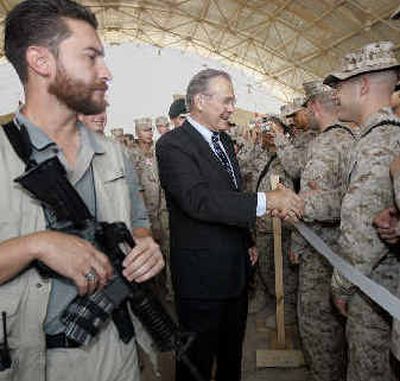Baghdad bombs kill at least 11

BAGHDAD, Iraq – Car bombers struck twice in rapid succession in the capital Sunday, killing at least 11 people including an American soldier, as Defense Secretary Donald Rumsfeld warned that violence may increase before the January election.
Rocket-propelled grenade explosions and machine-gun fire rocked the insurgent stronghold of Ramadi, west of Baghdad, late Sunday. Residents reached by telephone said insurgents launched attacks in a half dozen parts of Ramadi, and that four huge explosions shook the center of the city Sunday night.
Iraq’s most feared terror group – Tawhid and Jihad – claimed responsibility for the near-simultaneous car bombings, one near an east Baghdad police academy and the other outside an east Baghdad market as an American military convoy was passing by.
At least 16 people were wounded.
An American soldier was fatally injured in the convoy attack, U.S. and Iraqi officials said. One Iraqi was wounded in that attack. The Kindi Hospital said it received 10 bodies from the police academy blast, and police said 15 others were injured there.
In a statement posted on the Web, Tawhid and Jihad, led by Jordanian terrorist Abu Musab al-Zarqawi, said the car bombings were carried out by its military wing and were “martyrdom” operations, meaning suicide attacks.
Al-Zarqawi’s group also warned it would continue “to slaughter infidels” until the Americans and their Iraqi allies release all women detained in Iraq. The warning was part of a message contained in a videotape posted Sunday on the Web depicting the brutal decapitation of British hostage Kenneth Bigley.
Bigley, whose death was announced by his family Friday, was shown pleading for British Prime Minister Tony Blair to save his life moments before assailants severed his head with a knife. His body has not been found.
The Sunday Times newspaper of London reported that Bigley was killed after briefly escaping by car after British intelligence helped bribe two of the captors. Bigley was recaptured and the two captors who helped him were killed, the newspaper said.
Elsewhere, the U.S. command said a Marine was killed Saturday by hostile fire in Anbar province but gave no further details. The latest violence occurred as Rumsfeld arrived for an unannounced visit, his first to this country since the United States handed over sovereignty to an interim Iraqi government June 28.
Rumsfeld flew to a U.S.-controlled air base in the western desert, where he fielded questions at a town hall style meeting with about 1,500 Marines. He warned that the insurgents were likely to step up attacks before national elections in January, so it was unlikely the U.S. military could withdraw any troops before then.
“Our hope is that as we build up Iraqi forces we will be able to relieve the stress on our forces and see a reduction in coalition forces over some period of time, probably post-Iraqi election. But again, it will depend entirely on the security situation here in this country,” Rumsfeld said.
Interim Prime Minister Ayad Allawi hopes to suppress insurgents and take control of rebel enclaves before the legislative elections. U.S. and Iraqi officials have been negotiating for weeks with tribal and religious leaders in key rebel areas but have said they are prepared to use force if talks fail, as they did in Samarra last month.
Under an agreement with government negotiators, Shiite militiamen loyal to radical cleric Muqtada al-Sadr are to begin handing over weapons to Iraqi police today in their stronghold Sadr City. The weapons transfer is supposed to last five days, after which Iraqi police and National Guardsmen will assume security responsibility for the teeming Shiite district.
The government’s national security adviser, Qassem Dawoud, said Allawi’s administration will commit more than $500 million to rebuild Sadr City, scene of weeks of heavy fighting between U.S. troops and al-Sadr’s militia.
Talks are also under way between Allawi’s government and representatives of Fallujah, the main insurgent bastion west of Baghdad. Iraqi officials have said a final agreement is near to allow the government to regain control of the city but some key details must be finalized.